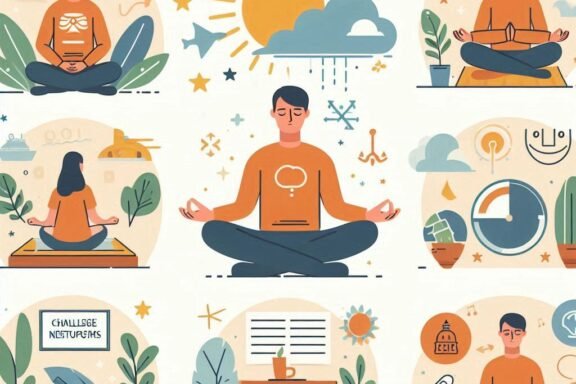I. Understanding Meditation
A Definition Historical Context
Meditation is a practice that involves focusing the mind and eliminating distractions to achieve a heightened state of awareness and calm. It has been around for thousands of years, with roots back to ancient cultures in India, China, and the Mediterranean. These traditions saw meditation not just as a spiritual exercise but as a means to improve mental clarity and emotional stability. Over time, meditation practices have evolved, from the formal rituals of ancient traditions to more accessible forms practiced today.
B. Different Types of Meditation
There are several types of meditation, each serving various purposes:
- Mindfulness meditation focuses on staying present and fully engaging with the moment, allowing thoughts and feelings to flow without judgement.
- Transcendental meditation involves repeating a mantra to promote a deep state of relaxation and awareness.
- Loving-kindness meditation encourages practitioners to cultivate an attitude of love and compassion toward themselves and others, enhancing emotional connections.
C. The Science Behind Meditation
Meditation has a profound effect on the brain. Studies show that regular practice can increase grey matter density in areas related to memory, sense of self, and emotional regulation. Psychological theories like the Mindfulness-Based Stress Reduction (MBSR) program support the idea that meditation enhances mental health. Recent research indicates that consistent practice can lead to lower levels of anxiety and depression, better emotional regulation, and improved overall well-being.
II. The Mental Health Benefits of Meditation
A. Reducing Symptoms of Anxiety
Meditation can significantly lower stress levels, which are often linked to anxiety. By focusing on breath and mindfulness, individuals can learn to manage anxious thoughts better. For instance, case studies have shown that people who practiced mindfulness meditation experienced a notable reduction in anxiety symptoms.
B. Enhancing Emotional Well-being
Meditation plays a crucial role in improving mood and alleviating symptoms of depression. The practice encourages a greater sense of self-awareness and emotional resilience. Regular meditators often report feeling more balanced and able to cope with life’s challenges, which can lead to a more positive outlook on life.
C. Increasing Focus and Clarity
Meditation sharpens attention and strengthens the ability to focus. Techniques like mindful breathing can enhance concentration in everyday life. Many individuals find that practicing mindfulness leads to improved decision-making skills, as they learn to pause and reflect before reacting.

III. Practical Steps for Starting a Meditation Practice
A. Finding the Right Space and Time
Creating a conducive environment for meditation is key. Select a quiet space free from distractions and find a time that works for you, whether in the morning or before bed. Consistency is critical; establishing a regular practice fosters deeper benefits.
B. Different Techniques to Try
Here are some techniques to explore:
- Mindfulness meditation: Sit comfortably, close your eyes, and focus on your breath. If your mind wanders, gently bring it back to your breath.
- Guided meditation apps: Many apps offer structured sessions that can help beginners ease into meditation.
- Group meditation sessions: Joining a community can provide support and motivation, making the practice more enjoyable.
C. Overcoming Common Challenges
Distractions during meditation are normal. If you find your mind wandering, gently redirect your focus. If you experience discomfort or restlessness, it’s okay to adjust your position or take a break. Remember to be kind to yourself and maintain motivation by setting small, achievable goals.
IV. Long-term Impact of Regular Meditation
A. Building a Sustainable Practice
Incorporate meditation into your daily life by setting realistic goals for how often you want to practice. As your needs change, be open to adapting your techniques, ensuring your practice remains relevant and beneficial.
B. The Ripple Effects on Personal Relationships
Meditation can enhance empathy and compassion, leading to improved communication skills. As you become more present and aware, your relationships can deepen, fostering stronger connections with others.
C. Meditation’s Role in Personal Growth
Meditation encourages self-awareness and introspection, aiding in personal goal setting. Understanding yourself better often influences your overall mental health and provides direction in personal growth.
V. Real-life Stories of Transformation
A. Personal Accounts from Meditation Practitioners
Many individuals have shared transformative experiences after starting meditation. Some have overcome anxiety and found emotional healing, while others report enhanced focus in high-pressure environments.
B. Insights from Mental Health Professionals
Therapists often highlight the importance of integrating meditation into mental health treatment. Evidence-based practices show that meditation can be a powerful tool in therapy, providing individuals with effective coping strategies.
C. Cultural Perspectives on Meditation
Around the world, different cultures see meditation’s value for mental health. Traditional practices are being adapted to fit modern lifestyles, revealing the universal benefits of meditation.
Conclusion
Meditation offers numerous benefits for mental health, promoting inner peace, emotional well-being, and personal growth. Starting a consistent practice can be transformative, helping you navigate life’s challenges with a greater sense of calm and clarity. Explore meditation as a valuable tool for your journey toward mental well-being.
FAQs
- How long should I meditate each day for the best results?
- Starting with just 5-10 minutes a day can be beneficial. As you get comfortable, you can gradually increase the duration.
- Can meditation replace traditional therapy or medication?
- Meditation can complement traditional therapy and medication, but it’s essential to consult with a healthcare professional for personalized advice.
- What if I find it difficult to sit still while meditating?
- It’s perfectly normal to feel restless. Try starting with shorter sessions or incorporating movement, like walking meditation.
- Are there any risks associated with meditation?
- While generally safe, some people may experience discomfort or heightened emotions. If you have specific mental health concerns, speaking with a professional before starting is a good idea.
- How do I know which type of meditation is right for me?
- Experiment with different styles and see which resonates best. Listening to your feelings and preferences will guide you toward the right practice.








This is very helpful